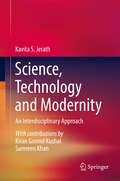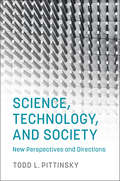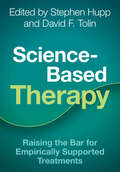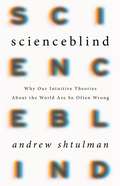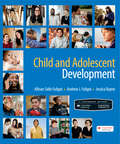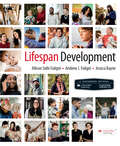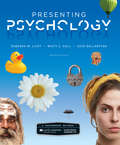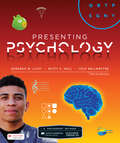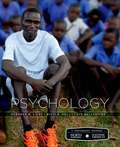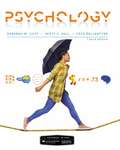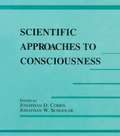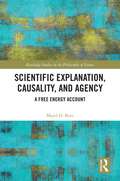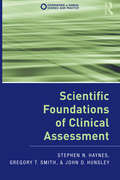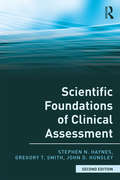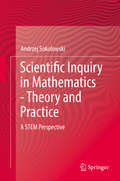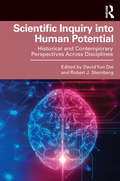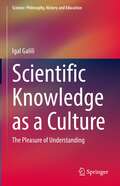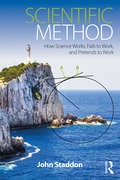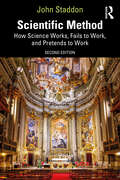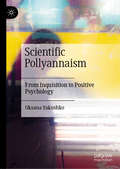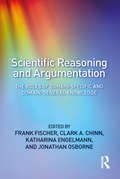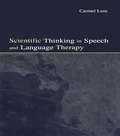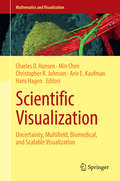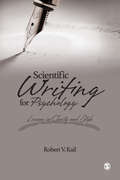- Table View
- List View
Science, Technology and Modernity: An Interdisciplinary Approach
by Kavita S. JerathThis book provides a full scale description and discussion of science, technology, society, cross-cultural communication and modernity and is presented at a level that makes it accessible to the interested academic. Starting with the historical overview, the text outlines the relevance of technology today and in the future. Then follows an introduction to the discovery and invention by agricultural, feudal, capitalist and socialist systems, and conversely the ways in which science and technology has altered economic, social, and political beliefs and practices during industrial revolutions and have transformed the whole nature of human society. Tracing the relationship between science and technology from dawn to civilization to the twenty first century, the book argues that technology is applied science and vice versa and this phenomenon emerged relatively recently, as industry and governments began funding scientific research that would lead to new technologies. The book goes beyond technology by also describing the path from modernity to post modernity and discussing the theories of modernity. Further the internet and social media receive increased attention as well. Finally, the discussion turns to the future structure of society and gender equality, expected to have a more distributed future generation, thereby addressing the synergies between education system, globalization and cross-cultural communication.This book is designed as the primary general textbook for Engineers at the undergraduate level in any university. This course is a multidisciplinary elective course from emerging areas in the 4- year institution and is a required course in most universities.
Science, Technology, and Society: New Perspectives and Directions
by Todd L. PittinskyThis book gathers inter-disciplinary and multi-disciplinary perspectives on the effects that today's advances in science and technology have on issues ranging from government policy-making to how we see the differences between men and women. The chapters investigate how invention and innovation really take place, how science differs from competing forms of knowledge, and how science and technology could contribute more to the greater good of humanity. For instance, should there be legal restrictions on 'immoral inventions'? A key theme that runs throughout the book concerns who is taken into account at each stage and who is affected. The amount of influence users have on technology development and how non-users are factored in are evaluated as the impact of scientific and technological progression on society is investigated, including politics, economy, family life, and ethics.
Science-Based Therapy: Raising the Bar for Empirically Supported Treatments
by David F. Tolin Stephen HuppThis is the first book to analyze empirically supported treatments by using the newest criteria from the American Psychological Association's Society of Clinical Psychology, Division 12. Clinicians, scholars, and students all need to stay updated on the treatment research, and this book goes beyond providing updated treatment information by pointing readers to other useful treatment manuals and websites for continuing to stay up-to-date. The chapters, all written by prominent experts, highlight the best available evidence for specific disorders by breaking treatments down into credible components. With an emphasis on treatments for adults, chapters also share information about treatments for youth. Other variables that influence treatment are discussed, including assessment, comorbidity, demographics, and medication. Each chapter also corresponds with a chapter in the companion book, Pseudoscience in Therapy, presenting a full picture of the evidence base for common treatments.
Scienceblind: Why Our Intuitive Theories About the World Are So Often Wrong
by Andrew ShtulmanHumans are born to create theories about the world--unfortunately, they're usually wrong, and keep us from understanding the world as it really isWhy do we catch colds? What causes seasons to change? And if you fire a bullet from a gun and drop one from your hand, which bullet hits the ground first? In a pinch we almost always get these questions wrong. Worse, we regularly misconstrue fundamental qualities of the world around us. In Scienceblind, cognitive and developmental psychologist Andrew Shtulman shows that the root of our misconceptions lies in the theories about the world we develop as children. They're not only wrong, they close our minds to ideas inconsistent with them, making us unable to learn science later in life. So how do we get the world right? We must dismantle our intuitive theories and rebuild our knowledge from its foundations. The reward won't just be a truer picture of the world, but clearer solutions to many controversies-around vaccines, climate change, or evolution-that plague our politics today.
Sciences of Modernism
by Paul PeppisSciences of Modernism examines key points of contact between British literature and the human sciences of ethnography, sexology, and psychology at the dawn of the twentieth century. The book is divided into sections that pair exemplary scientific texts from the period with literary ones, charting numerous collaborations and competitions occurring between science and early modernist literature. Paul Peppis investigates this exchange through close readings of literary works by Claude McKay, E. M. Forster, Mina Loy, Rebecca West, and Wilfred Owen alongside science books by Alfred Haddon, Havelock Ellis, Marie Stopes, Bernard Hart, and William Brown. In so doing, Peppis shows how these competing disciplines participated in the formation and consolidation of modernism as a broad cultural movement across a range of critical discourses. His study will interest students and scholars of the history of science, literary modernism, and English literature more broadly.
Scientific American: Child and Adolescent Development
by Jessica Bayne Allison Sidle Fuligni Andrew FuligniThe Story of Development Told through the Lives of Real People. Contemporary science and real-life applications unite in this unique story-telling approach to human development, built around the stories of 16 children, adolescents, and their families from communities across the United States.
Scientific American: Lifespan Development
by Jessica Bayne Allison Sidle Fuligni Andrew FuligniA journey through the current landscape of lifespan development through a series of Scientific American-style profiles of some extraordinary individuals.
Scientific American: Presenting Psychology
by Deborah Licht Misty Hull Coco BallantyneIn this breakthrough student resource, two committed, tech-savvy professors, Deborah Licht and Misty Hull, combine years of research and teaching insights with the journalistic skill of science writer, Coco Ballantyne, who came to the project directly from Scientific American. Together, they have created an introductory psychology textbook and online learning and comprehension system that draws on written profiles and video interviews of 26 real people to help students better understand, remember, apply, and relate to psychology’s foundational concepts and ideas. Beautifully designed, the printed text is filled with high-interest examples and features, including full-page infographics that help students understand and retain key concepts. Online, additional author-created resources, including scaffolded activities and adaptive quizzes, provide a seamless learning experience for students and a reliable assessment mechanism for instructors and programs. This innovative collaboration between Worth Publishers and Scientific American reflects a commitment to engaging and educating all students, including those who sometimes seem difficult to engage—in the contemporary style of the world’s most respected science magazine. Along with student engagement with the personal stories, Presenting Psychology 2e also aims to: Demonstrate that psychology is a science Help students see the “big picture” Provide high-quality accessible visuals that make a difference! Illustrate real-world applications Maintain a positive perspective of psychology Emphasize gender and cultural diversity Help dispel myths Provide quality assessments Create interactive, technology-based learning that appeals to students
Scientific American: Presenting Psychology
by Deborah Licht Misty Hull Coco BallantyneWritten by two teachers and a science journalist, Presenting Psychology introduces the basics to psychology through magazine-style profiles and video interviews of real people, whose stories provide compelling contexts for the field’s key ideas.
Scientific American: Psychology
by Deborah Licht Misty Hull Coco BallantyneIn this breakthrough introduction to psychology, two committed, tech-savvy professors, Deborah Licht and Misty Hull, combine years of research and teaching insights with the journalistic skill of science writer, Coco Ballantyne, who came to this project directly from Scientific American. Together, they have created a an introductory textbook and online system that draws on written profiles and video interviews of 27 real people to help students better understand, remember, and relate to psychology's basic ideas. Beautifully designed, the printed text is filled with high-interest examples and features, including full-page infographics that help students understand and retain key concepts. Online, additional author-created resources, including scaffolded activities and adaptive quizzes, provide a seamless learning experience for students and a reliable assessment mechanism for instructors and programs. This innovative collaboration between Worth Publishers and Scientific American reflects a commitment to engaging and educating all students, including those who sometimes seem difficult to engage--in the contemporary style of the world's most respected science magazine. What's in the LaunchPad
Scientific American: Psychology
by Deborah Licht Misty Hull Coco BallantyneIn this breakthrough student resource, two committed, tech-savvy professors, Deborah Licht and Misty Hull, combine years of research and teaching insights with the journalistic skill of science writer, Coco Ballantyne, who came to the project directly from Scientific American. Together, they have created an introductory psychology textbook and online learning and comprehension system that draws on written profiles and video interviews of real people and their stories to help students better understand and relate to psychologys foundational concepts and ideas as well as solutions for the 10 challenges that face both students and instructors in the introductory course today. Beginning with addressing the top 10 Challenges facing instructors (creating relevance, student engagement, seeing psychology as a science, teaching the hardest concepts, and dispelling myths) and students (students see the big picture, learning the toughest concepts, seeing the connections between life and psychology, relevancy to the real world, and diversity) in the Preface, Scientific American: Psychology 3e is filled with high-interest examples and features, including full-page infographics that help students understand and retain key concepts. With a renewed emphasis on research methods in a brand new stand-alone Chapter 2 (Research Methods), this innovative collaboration between Worth Publishers and Scientific American reflects a commitment to engaging and educating all students, including those who sometimes seem difficult to engage - in the contemporary style of the worlds most respected science magazine. Also Available: Previous 2nd Edition
Scientific Approaches to Consciousness (Carnegie Mellon Symposia on Cognition Series)
by Jonathan W. Schooler Jonathan D. CohenThere are many ways to approach the understanding of consciousness. Questions about these ways have occupied philosophers and metaphysicians for centuries. During the early growth of cognitive science the problem of consciousness remained taboo, but an increasing number of studies have either implicitly or explicitly begun to bear on its nature. These have been inspired by a number of different different original questions, and focus on a variety of different empirical phenomena. Thus, studies of implicit memory, subliminal processing, strategic versus automatic processing, allocation of attention, and differences between information processes in the awake versus dreaming state all share a common assumption of a particular quality or state -- awakeness, awareness, alertness, namely consciousness -- that somehow can be distinguished from another type of state or states in which the subject is not aware of the information being processed. What distinguishes the cognitive psychological and cognitive neuroscience approach to the question of consciousness from that of philosophy and metaphysics is scientific methodology: a set of tools that permit the empirical study of a phenomenon in an objective and reproducible way. Recent developments in both the empirical and theoretical methodologies of these fields have made it possible to begin to study the phenomenon associated with -- if not directly underlying -- consciousness in a scientific fashion. This volume tries to resolve the difficulties associated with the scientific investigation of consciousness. The intent is to explore the extent to which consciousness can be the target of direct scientific inquiry, to get on the table some of the relevant work, and consider the degree to which this research can help inform our understanding of consciousness. It brings together a group of cognitive and neuroscientists to share relevant recent research in the fields of cognitive science and neuroscience and to determine whether any new strategies for the scientific pursuit of this question can be developed. A long-term goal is the development of a unified understanding of consciousness, scientific as well as philosophical perspectives. This volume takes the first step toward building the necessary local bridges.
Scientific Explanation, Causality, and Agency: A Free Energy Account (Routledge Studies in the Philosophy of Science)
by Majid D. BeniThis book draws on advances in computational neuroscience and theoretical biology to provide a clear and accessible agentive account of the nature of causality and scientific explanations.Instead of attempting to establish the elements of scientific explanation, such as causality, in a reality unadulterated by a human perspective, this book relies on scientific facts about cognition to describe the structure of agency from a distinctly human perspective. The book draws on the Free Energy Principle to reinforce the agency theory of causality and extend it to an account of explanation as well. This principle not only provides a theoretical account of how self-organising systems engage with the causal structure of the environment, but it also offers a viable notion of agency and is compatible with the projectivist aspects of the agency theory.Scientific Explanation, Causality, and Agency will appeal to researchers and advanced students working in philosophy of science, philosophy of cognitive science, epistemology, computational neuroscience, and theoretical biology.
Scientific Foundations of Clinical Assessment (Foundations of Clinical Science and Practice)
by Stephen N. Haynes Gregory T. Smith John D. HunsleyScientific Foundations of Clinical Assessment is a user-friendly overview of the most important principles and concepts of clinical assessment. It provides readers with a science-based framework for interpreting assessment research and making good assessment decisions, such as selecting the best instruments and measures and interpreting the obtained assessment data. Written in a direct and highly readable fashion, with plenty of clinical examples that illustrate the relevance of psychometric principles and assessment research, this text is one every professional and graduate student needs to read. Numerous elements are used consistently throughout the book to facilitate understanding and retention, such as: • text boxes that provide extended presentations of the application of principles and research• end-of-chapter summaries that review key issues covered, and• additional recommended sources for each chapter. A detailed glossary that defines key measurement and assessment concepts is also included, making this book an invaluable reference and supplementary text for anyone who does clinical assessment in the health and mental health domains.
Scientific Foundations of Clinical Assessment (Foundations of Clinical Science and Practice)
by Stephen N. Haynes Gregory T. Smith John D. HunsleyScientific Foundations of Clinical Assessment is a user-friendly overview of the most important principles and concepts of clinical assessment. It provides readers with a science-based framework for interpreting assessment research and making good assessment decisions, such as selecting the best instruments and measures and interpreting the obtained assessment data. Written in a direct and highly readable fashion, with plenty of clinical examples that illustrate the relevance of psychometric principles and assessment research, this text is one every professional and graduate student needs to read. The second edition is expanded and fully updated, and includes additional coverage of the principles and methods of developing new assessment instruments.
Scientific Inquiry in Mathematics - Theory and Practice: A Stem Perspective
by Andrzej SokolowskiThis valuable resource provides an overview of recent research and strategies in developing and applying modelling to promote practice-based research in STEM education. In doing so, it bridges barriers across academic disciplines by suggesting activities that promote integration of qualitative science concepts with the tools of mathematics and engineering. The volume’s three parts offer a comprehensive review, by 1) Presenting a conceptual background of how scientific inquiry can be induced in mathematics classes considering recommendations of prior research, 2) Collecting case studies that were designed using scientific inquiry process designed for math classes, and 3) Exploring future possibilities and directions for the research included within. Among the topics discussed: · STEM education: A platform for multidisciplinary learning. · Teaching and learning representations in STEM. · Formulating conceptual framework for multidisciplinary STEM modeling. · Exploring function continuity in context. · Exploring function transformations using a dynamic system. Scientific Inquiry in Mathematics - Theory and Practice delivers hands-on and concrete strategies for effective STEM teaching in practice to educators within the fields of mathematics, science, and technology. It will be of interest to practicing and future mathematics teachers at all levels, as well as teacher educators, mathematics education researchers, and undergraduate and graduate mathematics students interested in research based methods for integrating inquiry-based learning into STEM classrooms.
Scientific Inquiry into Human Potential: Historical and Contemporary Perspectives Across Disciplines
by David Yun Dai and Robert J. SternbergScientific Inquiry into Human Potential explores the intellectual legacy and contemporary understanding of scientific research on human intelligence, performance, and productivity. Across nineteen chapters, some of the most eminent scholars of learning and psychology recount how they originated, distinguished, measured, challenged, and adapted their theories on the nature and nurture of human potential over decades of scientific research. These accessible, autobiographical accounts cover a spectrum of issues, from the biological underpinnings and developmental nature of human potential to the roles of community, social interaction, and systematic individual differences in cognitive and motivational functioning. Researchers, instructors, and graduate students of education, psychology, sociology, and biology will find this book not only historically informative but inspiring to their own ongoing research journeys, as well.
Scientific Knowledge as a Culture: The Pleasure of Understanding (Science: Philosophy, History and Education)
by Igal GaliliThis book, in its first part, contains units of conceptual history of several topics of physics based on the research in physics education and research based articles with regard to several topics involved in teaching science in general and physics in particular. The second part of the book includes the framework used, the approach considering science knowledge as a special type of culture – discipline-culture. Within this approach, scientific knowledge is considered as comprised of a few inclusive fundamental theories each hierarchically structured in a triadic pattern: nucleus-body-periphery. While nucleus incorporates the basic principles and body comprises their implementations in the variety of laws, models, and experiments, periphery includes concepts at odds to the nucleus. This structure introduces knowledge in its conceptual variation thus converting disciplinary knowledge to cultural-disciplinary one. The approach draws on history and philosophy of science (HPS) necessary for meaningful learning of science. It is exemplified in several aspects regarding teaching physics, presenting history in classes, considering the special nature of science, and using artistic images in regular teaching. The revealed conceptual debate around the chosen topics clarifies the subject matter for school students and teachers encouraging construction of Cultural Content Knowledge. Often missed in teachers' preparation and common curriculum it helps genuine understanding of science thus providing remedy of students' misconceptions reported in educational research.
Scientific Method: How Science Works, Fails to Work, and Pretends to Work
by John StaddonThis book shows how science works, fails to work, or pretends to work, by looking at examples from such diverse fields as physics, biomedicine, psychology, and economics. Social science affects our lives every day through the predictions of experts and the rules and regulations they devise. Sciences like economics, sociology and health are subject to more ‘operating limitations’ than classical fields like physics or chemistry or biology. Yet, their methods and results must also be judged according to the same scientific standards. Every literate citizen should understand these standards and be able to tell the difference between good science and bad. Scientific Method enables readers to develop a critical, informed view of scientific practice by discussing concrete examples of how real scientists have approached the problems of their fields. It is ideal for students and professionals trying to make sense of the role of science in society, and of the meaning, value, and limitations of scientific methodology in the social sciences.
Scientific Method: How Science Works, Fails to Work, and Pretends to Work
by John StaddonThis expanded second edition of Scientific Method shows how science works, fails to work or pretends to work by looking at examples from physics, biomedicine, psychology, sociology and economics.Scientific Method aims to help curious readers understand the idea of science, not by learning a list of techniques but through examples both historical and contemporary. Staddon affirms that if the reader can understand successful studies as well as studies that appear to be scientific but are not, they will become a better judge of the “science” in circulation today. To this end, this new edition includes a new chapter, What is Science?, which points out that science, like any human activity, has its own set of values, with truth being the core. Other new chapters focus on the emergence of AI and machine learning, science and diversity, and behavioral economics. The book also includes textual features such as bullet-points and text boxes on topical issues.Scientific Method is essential reading for students and professionals trying to make sense of the role of science in society, and of the meaning, value and limitations of scientific methodology.
Scientific Pollyannaism: From Inquisition to Positive Psychology
by Oksana YakushkoThis book argues that the story of the orphan girl Pollyanna (namely, her strategy of playing the “glad games” to manage loss, abuse, and social prejudice) serves as a framework for critiquing historical forms of Western scientific Pollyannaism. The author examines Pollyannaism as it relates to the sciences, demonstrating how the approach has been used throughout modern Western history to enforce happiness and to criticize negative human emotional states. These efforts, carried out by scientists and popularized as scientific, focus on negating the role of the environment and on promoting varied forms of emotional control. Ultimately, the book emphasizes strategies used to compel individuals into becoming Pollyannas about science itself.
Scientific Reasoning and Argumentation: The Roles of Domain-Specific and Domain-General Knowledge
by Frank Fischer Jonathan Osborne Clark A. Chinn Katharina EngelmannCompetence in scientific reasoning is one of the most valued outcomes of secondary and higher education. However, there is a need for a deeper understanding of and further research into the roles of domain-general and domain-specific knowledge in such reasoning. This book explores the functions and limitations of domain-general conceptions of reasoning and argumentation, the substantial differences that exist between the disciplines, and the role of domain-specific knowledge and epistemologies. Featuring chapters and commentaries by widely cited experts in the learning sciences, educational psychology, science education, history education, and cognitive science, Scientific Reasoning and Argumentation presents new perspectives on a decades-long debate about the role of domain-specific knowledge and its contribution to the development of more general reasoning abilities.
Scientific Thinking in Speech and Language Therapy
by Carmel LumSpeech and language pathologists, like all professionals who claim to be scientific in their practice, make a public commitment to operate on the basis of knowledge derived in accordance with sound scientific standards. Yet students in communication disorders are given relatively little grounding in the fundamentals of science; indeed, they often receive implicit encouragement to rely on clinical wisdom. This pathbreaking text introduces the principles of critical scientific thinking as they relate to assessing communication problems, deciding about alternative approaches to intervention, and evaluating outcomes. The author provides many illustrative examples to help readers contextualize the ideas. Her clear presentation will help not only undergraduate and graduate students but also established professionals reason more effectively about what they are doing and why. Though the examples come from speech and language pathology, this illuminating and readable book constitutes a valuable resource for all clinical practitioners.
Scientific Visualization
by Hans Hagen Min Chen Charles D. Hansen Christopher R. Johnson Arie E. KaufmanBased on the seminar that took place in Dagstuhl, Germany in June 2011, this contributed volume studies the four important topics within the scientific visualization field: uncertainty visualization, multifield visualization, biomedical visualization and scalable visualization. * Uncertainty visualization deals with uncertain data from simulations or sampled data, uncertainty due to the mathematical processes operating on the data, and uncertainty in the visual representation, * Multifield visualization addresses the need to depict multiple data at individual locations and the combination of multiple datasets, * Biomedical is a vast field with select subtopics addressed from scanning methodologies to structural applications to biological applications, * Scalability in scientific visualization is critical as data grows and computational devices range from hand-held mobile devices to exascale computational platforms. Scientific Visualization will be useful to practitioners of scientific visualization, students interested in both overview and advanced topics, and those interested in knowing more about the visualization process.
Scientific Writing for Psychology: Lessons in Clarity and Style
by Robert V. KailScientific Writing for Psychology: Lessons in Clarity and Style provides straightforward, hands-on strategies to help psychology students master scientific writing. At the core of this brief and engaging guide are seven class-tested lessons: three devoted to sentences, one to paragraphs, and three to writing research reports. Packed with helpful examples and an abundance of writing wisdom, this book addresses the skills every successful writer needs.
